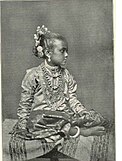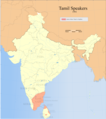Portal:Tamils
The Tamils portal
The Tamils (/ˈtæmɪlz, ˈtɑː-/ TAM-ilz, TAHM-), also known as the Tamilar, are a Dravidian ethnolinguistic group who natively speak the Tamil language and trace their ancestry mainly to the southern part of the Indian subcontinent. The Tamil language is one of the longest-surviving classical languages, with over two thousand years of written history, dating back to the Sangam period (between 300 BCE and 300 CE). Tamils constitute about 5.7% of the Indian population and form the majority in the South Indian state of Tamil Nadu and the union territory of Puducherry. They also form significant proportion of the population in Sri Lanka (15.3%), Malaysia (7%) and Singapore (5%). Tamils have migrated world-wide since the 19th century CE and a significant population exists in South Africa, Mauritius, Fiji, as well as other regions such as the Southeast Asia, Middle East, Caribbean and parts of the Western World.
Archaeological evidence from Tamil Nadu indicates a continuous history of human occupation for more than 3,800 years. In the Sangam period, Tamilakam was ruled by the Three Crowned Kings of the Cheras, Cholas and Pandyas. Smaller Velir kings and chieftains ruled certain territories and maintained relationship with the larger kingdoms. Urbanisation and mercantile activity developed along the coasts during the later Sangam period with the Tamils influencing the regional trade in the Indian Ocean region. Artifacts obtained from excavations indicate the presence of early trade relations with the Romans. The major kingdoms to rule the region later were the Pallavas (3rd–9th century CE), and the Vijayanagara Empire (14th–17th century CE). The island of Sri Lanka often saw attacks from the Indian mainland with the Cholas establishing their influence across the island and across several areas in Southeast Asia in the 10th century CE. This led to the spread of Tamil influence and contributed to the cultural Indianisation of the region. Scripts brought by Tamil traders like the Grantha and Pallava scripts, induced the development of many Southeast Asian scripts. The Jaffna Kingdom later controlled the Tamil territory in the north of the Sri Lanka from 13th to 17th century CE. European colonization began in the 17th century CE, and continued for two centuries until the middle of the 20th century. (Full article...) Selected article -Cilappatikāram (Tamil: சிலப்பதிகாரம், Malayalam: ചിലപ്പതികാരം, IPA: ʧiləppət̪ikɑːrəm, lit. "the Tale of an Anklet"), also referred to as Silappathikaram or Silappatikaram, is the earliest Tamil epic. It is a poem of 5,730 lines in almost entirely akaval (aciriyam) meter. The epic is a tragic love story of an ordinary couple, Kaṇṇaki and her husband Kōvalaṉ. The Cilappatikāram has more ancient roots in the Tamil bardic tradition, as Kannaki and other characters of the story are mentioned or alluded to in the Sangam literature such as in the Naṟṟiṇai and later texts such as the Kovalam Katai. It is attributed to a prince-turned-monk Iḷaṅkō Aṭikaḷ, and was probably composed in the 2nd century CE. The Cilappatikāram is set in a flourishing seaport city of the early Chola kingdom. Kaṇṇaki and Kōvalaṉ are a newly married couple, in love, and living in bliss. Over time, Kōvalaṉ meets Mātavi (Mādhavi) – a courtesan. He falls for her, leaves Kaṇṇaki and moves in with Mātavi. He spends lavishly on her. Kaṇṇaki is heartbroken, but as the chaste woman, she waits despite her husband's unfaithfulness. During the festival for Indra, the rain god, there is a singing competition. Kōvalaṉ sings a poem about a woman who hurt her lover. Mātavi then sings a song about a man who betrayed his lover. Each interprets the song as a message to the other. Kōvalaṉ feels Mātavi is unfaithful to him and leaves her. Kaṇṇaki is still waiting for him. She takes him back. (Full article...) General imagesSelected biography -Muthuvel Karunanidhi (3 June 1924 – 7 August 2018) was an Indian writer and politician who served as Chief Minister of Tamil Nadu for almost two decades over five terms between 1969 and 2011. He is popularly referred to as Kalaignar (Artist) and Mutthamizh Arignar (Tamil Scholar) for his contributions to Tamil literature. He had the longest intermittent tenure as Chief Minister of Tamil Nadu with 6,863 days in office. He was also a long-standing leader of the Dravidian movement and ten-time president of the Dravida Munnetra Kazhagam political party. Karunanidhi has the record of never losing an election to the Tamil Nadu Assembly, having won 13 times since his first victory in 1957. Before entering politics, he worked in the Tamil film industry as a screenwriter. He also made contributions to Tamil literature, having written stories, plays, novels, and a multiple-volume memoir. Karunanidhi died on 7 August 2018 at Kauvery Hospital in Chennai after a series of prolonged, age-related illnesses. Karunanidhi was born in the Tamil Nadu village of Thirukkuvalai on 3 June 1924. His parents were from the Tamil-speaking Isai Vellalar community, a caste of musicians that perform at temples and other social gatherings. Growing up in a caste-ridden culture, Karunanidhi was learned about the crippling circumstances that arose from being born into a low caste. When he was 14, he formed a student movement against the imposition of Hindi as India's national language during the Anti-Hindi agitation of 1937–40. This served as a forerunner to Karunanidhi's wider anti-Hindi demonstrations in 1965. As a high school student, Karunanidhi created the Tamil Nadu Tamil Manavar Mandram, the Dravidian Movement's first student wing. He also started a news paper during his school days, which grew into the Murasoli, the DMK's official publication. Karunanidhi began participating in theatrical productions at a young age, including composing plays. Later on, he started writing for movies. As a writer, he wrote screenplays, historical novels, screenplays, biographies, poems and novels. He utilised his writing to propagate reformist ideals effectively. He wrote the script and dialogue for M. G. Ramachandran's maiden film as a hero, Rajakumari. He also composed the dialogue for Sivaji Ganesan's debut film, Parasakthi. He was critical of organised religion and superstition. He was an atheist and a self-described rationalist. (Full article...) CategoriesTopicsTamil People Countrywide: India • Sri Lanka • Canada • Malaysia • Singapore • South Africa • England Related Ethnic Groups: Brahui • Gond • Kannadiga • Khonds • Kodava • Oraon • Malayali • Telugus • Tuluvas Related indigenous Groups: Badagas • Toda • Kuruba
See also: List of Tamil people, Tamil script, Tamil Script Code for Information Interchange Related portalsWikiProjectsThings to do
Associated WikimediaThe following Wikimedia Foundation sister projects provide more on this subject:
Discover Wikipedia using portals |


























































